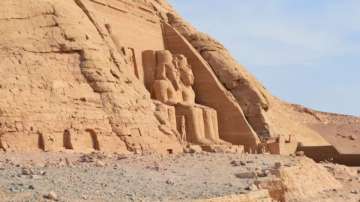Trending News: In a recent discovery, archaeologists found a statue that looks like a 2,000 years old sphinx near the Dendera Temple, located in Qena province of Southern Egypt. The statue has a smiling face and dimples. Preliminary reports suggest that the limestone statue belongs to the Roman era.
The statue is considered to be a representation of an ancient Roman emperor Claudius, who ruled from 41 to 54 AD. The statue is smaller than the sphinx in the Pyramids of Giza.
The smaller statue was discovered near the Hathor Temple, present inside the Dendera temple complex. Archaeologists also found a mud-brick basin, a two-layer platform from the Byzantine era, and a stone slab with hieroglyphic and demotic inscriptions from the Roman era. The oldest sphinx, found in the Pyramids of Giza stands at a height of 66 ft, much higher than the recently discovered one.
According to the Egyptian Antiquities Ministry, the Hathor Temple, present inside the Dendera temple complex, is one of Egypt's best-preserved ancient sites where the well-carved sphinx was found.
The Ministry of Tourism and Antiquities shared a photo on their Facebook account, informing that archaeologists found a statue of a Roman emperor in the form of a sphinx during excavation work in the east of the Dendera Temple in Qena Governorate.
FAQs
1. How old is the Great Sphinx of Giza?
Archeologists consider the Great Sphinx of Giza to be 4500 years old.
2. What does the face of the oldest sphinx represent?
The face of the Great Sphinx of Giza represents the pharaoh Khafre, during whose rule it was believed to be constructed.
